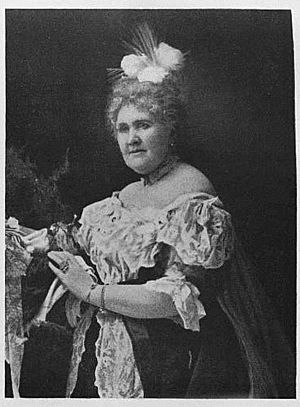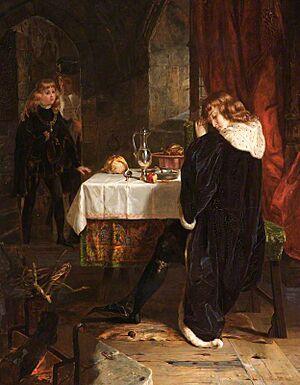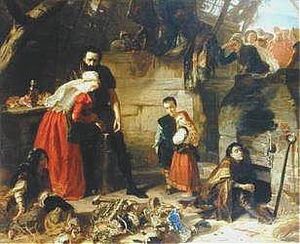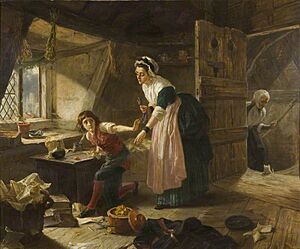Henrietta Ward facts for kids
Quick facts for kids
Henrietta Ward
|
|
|---|---|

Henrietta Ward, 1909
|
|
| Born |
Henrietta Mary Ada Ward
1 June 1832 London, United Kingdom
|
| Died | 12 July 1924 (aged 92) Slough, United Kingdom
|
| Nationality | British |
| Known for | Painting |
| Spouse(s) |
Edward Matthew Ward
(m. 1848; died 1879) |
Henrietta Mary Ada Ward (born June 1, 1832 – died July 12, 1924) was a talented British painter. She lived during the Victorian era and into the early 1900s. Henrietta was known for her historical paintings and her genre paintings. Genre paintings show scenes from everyday life.
Contents
Henrietta Ward's Early Life and Family
Henrietta Ward came from a family of artists. Her grandfather, James Ward, was a famous painter of animals. Her parents were also artists. Her father, George Raphael Ward, made prints. Her mother, Mary Webb Ward, painted tiny pictures called miniatures. One of her mother's paintings was Portrait of Henrietta Ward and her Favorite Guinea Pig.
Henrietta was an only child. She grew up around many famous artists who were friends with her parents. These included Sir Edwin Landseer and C. R. Leslie. She learned to paint at the Bloomsbury Art School. She also studied at an academy started by Henry Sass.
Henrietta's Marriage and Family Life
In 1843, when Henrietta was 11, she met Edward Matthew Ward. He was a historical painter, 27 years old. They fell in love and secretly married in May 1848. Edward's friend, Wilkie Collins, helped them. Henrietta's mother was very upset and did not forgive her. She removed Henrietta from her will.
Edward and Henrietta Ward had eight children. One of their sons was Leslie Ward, who became a famous cartoonist. He was known by the name "Spy." Even with a large family, Henrietta continued her painting career.
Henrietta's Art and Teaching
Henrietta painted many types of subjects. Like her husband, she was famous for her historical paintings. These included scenes about people like Thomas Chatterton and Elizabeth Fry. She also painted many pictures of children. She often used her own children as models for her artwork.
One of her most well-known paintings was Palissy the Potter. It was shown at the Royal Academy of Arts in 1866. This painting shows a moment where Bernard Palissy accidentally blew up his house. He was experimenting with making pottery. Other famous works include Queen Mary quitting Stirling Castle (1863) and Scene from the childhood of Joan of Arc (1867). These paintings made her one of the most important female history painters of her time.
Henrietta Ward also gave art lessons to some of the royal children. These were the children of Queen Victoria and Prince Albert.
Later Life and Legacy
Henrietta Ward and her husband supported women's right to vote. They were friends with other famous people like Charles Dickens and George Cruikshank.
Henrietta lived 45 years longer than her husband. After he died in 1879, she opened her own art school. This helped her support her family. She focused on training young women artists. She also received a special payment of £100 for teaching the royal children. Henrietta showed her paintings at the World's Columbian Exposition in Chicago in 1893.
She wrote two books about her life. The first was Mrs. E. M. Ward’s Reminiscences in 1911. The second was Memories of Ninety Years, published in the year she died. Her first book is considered a great account of a Victorian female artist's life.
Famous Paintings by Henrietta Ward
- The Market at Antwerp
- The Princes in the Tower (1861)
- At the Louvre, 1649 (1862)
- Queen Mary Quitting Stirling Castle (1863)
- Palissy the Potter (1866)
- Scene from the Childhood of Joan of Arc (1867)
- The Crown of the Feast (1868)
- Little Beatrice in the Arbour
- The Queens Lodge, Windsor, in 1786 (around 1872)
- Chatterton, 1765 (around 1873)
- Princess Charlotte of Wales (1877)
- Shut Out (1891)
- Peace and Plenty (1896)
 | Emma Amos |
 | Edward Mitchell Bannister |
 | Larry D. Alexander |
 | Ernie Barnes |




